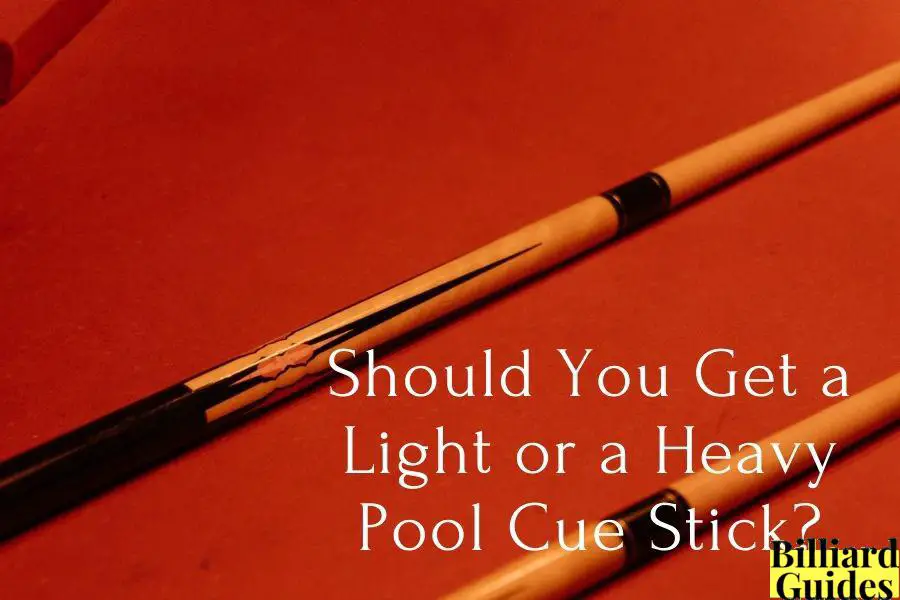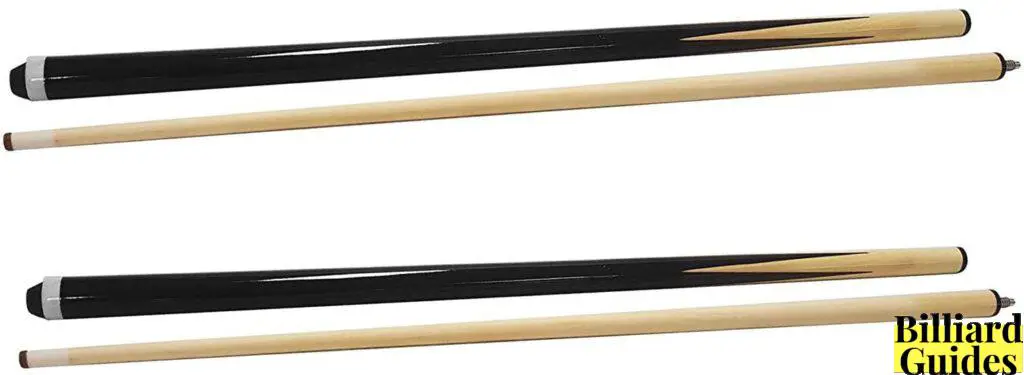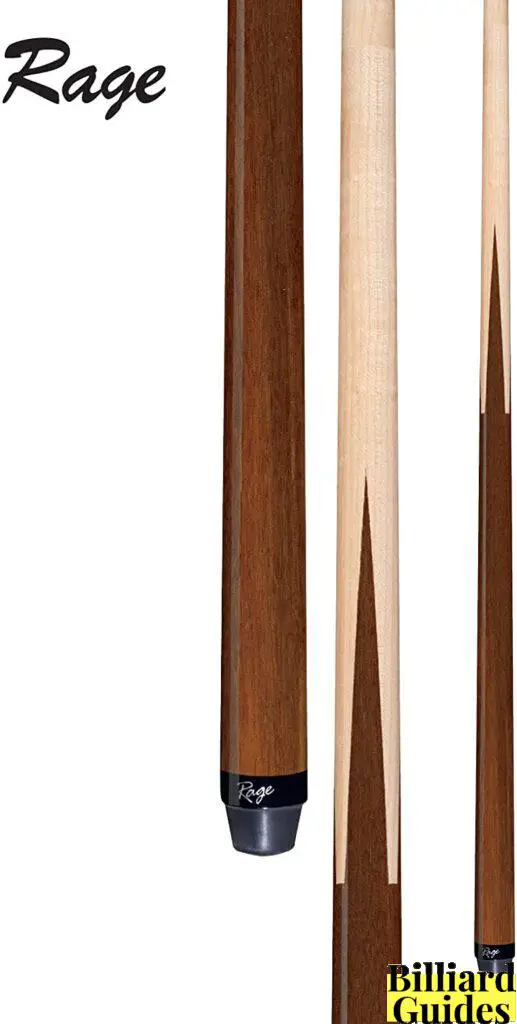I recently posted my guide to the best pool cue stick. In the article, I talked about the importance of knowing which types of cues to buy.
One of the questions that came up during the comments was whether it was better to get a heavier or lighter pool cue stick. Here are some pros and cons of each type of cue to help you decide which one is best for your game.
The pool is a game that everyone loves, right? It’s also a game that everyone has played at one time or another. But there are some questions about the pool stick that many people don’t consider, such as the following:
Should You Get a Light or a Heavy Pool Cue Stick?

When it comes to pool cues, there are many different types to choose from. The most important factor to consider is the diameter of the shaft.
If you are going to learn how to play pool, you need to know what kind of cue stick you should get.
A thick shaft will give you greater control, but a lighter cue stick will yield a more accurate shot.
A light stick is designed to make it easy for you to maneuver around the table.
A heavy stick is designed to deliver a heavy ‘thwack’ with every shot.
In case you haven’t been able to decide whether you should get a heavy or light pool cue stick, here’s what you need to know.
What is the Most Common Pool Cue Stick Weight?
The average pool cue stick weight is between 17 and 21 ounces. This is just what the industry standard is. Some people think that 17 ounces are too light, while others feel that 18 ounces are too heavy.
If you’re using a pool cue with an adjustable weight system, you can adjust the weight of the stick in half-ounce increments up to a maximum of 12 ounces.
Heavy vs. Light Pool Cues
When setting up a pool cue, you have two choices. You can either use a heavy or light cue stick. The choice depends on the material of the cue. A heavier cue stick is more flexible than a lighter one. But if you’re looking to improve your game, a lighter cue might be more useful.
The heavier cue stick is better for a power player, who wants to apply the maximum amount of force to the cue ball when it hits the ball. When you play pool, you can use a cue stick that is either too heavy or too light.
Absolutely nothing is perfect, so if you feel that your game could be improved by using a lighter pool stick, give it a try. What are the Benefits of Using a Heavy Pool Cue Stick?
Many people think that using a heavy cue stick is the only way to play pool. This is not true. Using a heavy cue stick can help you achieve certain goals, but it will also hinder other aspects of your game.
If you use a heavy cue stick, you’ll find it hard to make small precise movements with the shaft of the stick. You’ll also have a tough time controlling the amount of force you use when you make contact with the ball.
Lighter Pool Cue Pros and Cons
Lighter pool cues are easier to use and hold more shots than traditional cues. They are also easier to sharpen, but not as easy to maintain.
When choosing between a lighter or heavier pool cue, there are several pros and cons to consider. On the positive side, you’ll see more glide and less bounce. You’ll also be able to put less pressure on your joints while using a lighter cue.

A lighter cue will also be easier on your hands, so you’ll be less likely to get injured while playing. One of the downsides is that a lighter cue can feel less powerful. However, this isn’t always the case, and lighter cues may be better suited to a variety of pool styles.
The cost of a new pool cue can be quite expensive, because of their construction, lighter pool cues tend to break quite easily. Another downside is that when you’re playing pool, you have to spend a lot of time keeping the tip of the pool cue in good condition.
Heavier Pool Cue Pros and Cons
Using a heavier cue stick will give you more control over the cue ball. It will also allow you to apply more force when you make contact with the ball. Using a heavy cue stick will also make it easier to maneuver around the table. This is especially useful when you’re playing fast breaks or pocket billiards.

Heavy pool cues can deliver a powerful ‘thwack’ every time you hit the cue ball. This type of shot will leave an imprint on the felt. The heavier the stick, the more indelible this mark will be. But using a heavy cue will take some practice to learn how to use the proper amount of force.
Surprisingly, heavier cues can have a negative impact on your ability to hold shots. This is because heavier cues tend to be stiffer. This will make it harder for you to play precise shots because you won’t have the flexibility to make small movements with the shaft of the cue. The lighter the pool cue, the easier it will be to control the cue ball.
When playing a heavy cue, you have to work harder to make contact with the ball. Which Pool Cue Is Best For You? If you are new to the game of pool, then you’ll probably want to use a lighter pool cue. On the other hand, if you’re an experienced player, a heavier pool stick will give you more control over your game.
Which One Should You Pick?
If you are a recreational pool player and just want to give your game a kick, then stick with a lighter pool stick. A lighter cue will allow you to play with more finesse and precision. You’ll also find it easier to make small precise movements.
If you’re using a lighter pool cue, you may not want to go out of your way to buy a heavy one. However, if you are looking for the best possible performance out of your cue, you’ll need a heavier one. Using a heavier pool cue will allow you to apply more force to the ball. This will make it easier for you to make contact with the ball. You’ll also be able to hold more shots.
And then you’ll have a better chance of making those difficult shots. If you’re an experienced player who wants to use your pool cue for a variety of different types of shots, you may want to consider a heavier pool stick. A heavier cue will help you apply more force to the ball when you are making shots.
This will allow you to control the ball with precision. On the other hand, using a lighter pool stick will make it easier to maneuver around the table. You’ll be able to make small movements with the shaft of your cue.
Conclusion
In conclusion, it depends on how much you value your wrist, the type of pool you play, and how many times you play in a row. If you play regularly for more than 10 minutes at a time, then a heavy cue stick is probably what you need.
However, if you just want to practice your serve, or just like to feel the weight of a stick, then a light cue stick will do just fine. The best thing to do is to experiment and see which stick feels better to you.
Wrapping It Up… Most players agree that a standard 19-ounce cue stick is just right. It gives you enough weight to play aggressively, but not so much that it becomes difficult to make small precise movements with the shaft of the cue.
Just remember: Using a heavier cue will help you achieve certain goals, but it will also hinder other aspects of your game.
There is no single best choice when it comes to using a heavy or light pool cue. Whatever choice you make will be beneficial in some ways and detrimental in others.
Interesting Articles to Read
- Best Pool Cues: Top 13 Picks
- Top 13 Best Break Cue of 2022 [#2 is Our Favorite]
- Best Pool Cue for Beginners: Our Top 10 Picks
- Best Pool Tables: Our Top 9 Picks of 2022
- The 10 Best Pool Cue for Intermediate Players
- 7 Best Pool Cue for Advanced Players
- Players Technology Series HXT15 Two-Piece Pool Cue Review